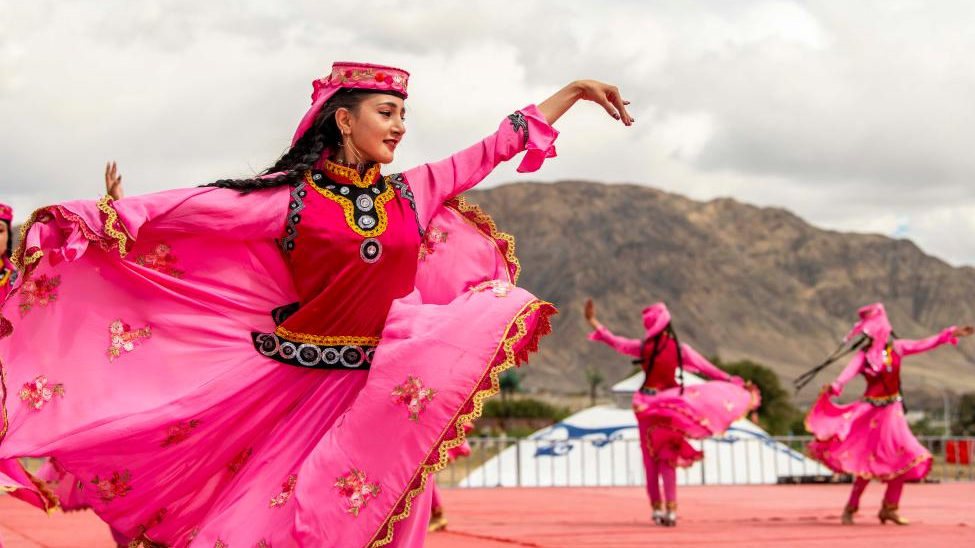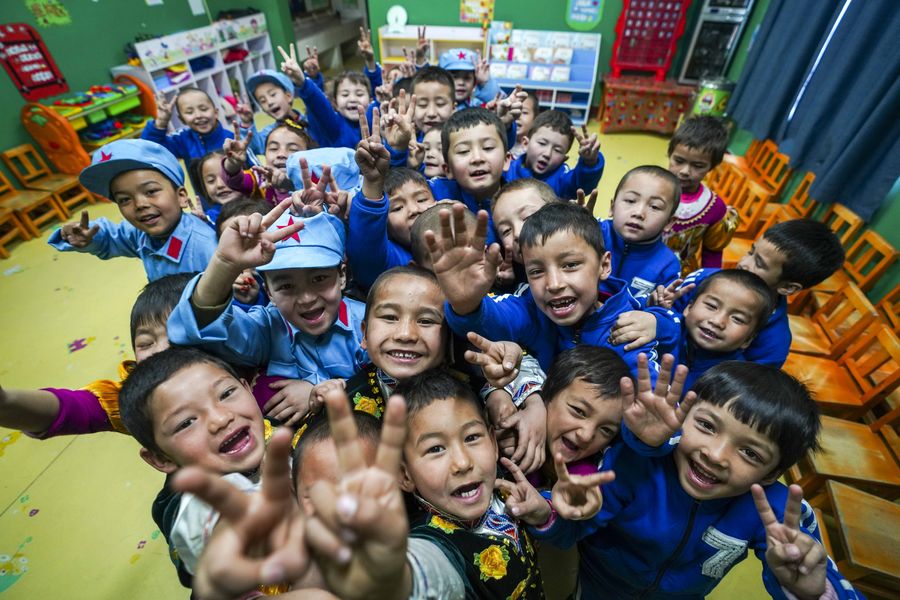
Celebrating the Dragon Boat Festival at an intangible cultural heritage exhibition park in Taxkorgan Tajik Autonomous County, northwest China's Xinjiang Uygur Autonomous Region, June 25, 2020. [Photo/Xinhua]
By Bai Fan
The Office of the High Commissioner for Human Rights (OHCHR) released its "Assessment of human rights concerns in the Xinjiang Uyghur Autonomous Region of China" on August 31. The "assessment" appears to be based on China's laws and parts on witness' testimony. But the truth is that the "assessment" distorts China's laws and policies, as well as taking the words of a few anti-China separatists for its testimony. This is a logically incoherent report full of arrogance, absurdity and double standards, which make five fundamental mistakes.
The OHCHR report reflects a political arrogance — the organization does not accept others or their culture, but think of themselves as being superior. Agnes Callamard, Secretary General of Amnesty International, a Cold War-era organization, who has been criticized for foreign policy bias against communist countries, said that "the report draws on analyses of Chinese laws, regulations, and policies to demonstrate that they violated international human rights law…The inexcusable delay in releasing this report casts a stain on the OHCHR's record, but this should not deflect from its significance."
However, this "significant" report of the OHCHR is a violation of Article 2 of the United Nations Charter, which states that "the organization is based on the principle of the sovereign equality of all its members" and "nothing contained in the present Charter shall authorize the United Nations to intervene in matters which are essentially within the domestic jurisdiction of any state." As a sovereign state, China formulated its anti-terrorism law and the Regulations of Xinjiang Uygur Autonomous Region on De-radicalization with a common goal: the protection of the lives, health and dignity of persons.
The OHCHR report criticized China's legal system like preachers, which is a threat to China's judicial sovereignty and a violation of the UN Charter. The OHCHR and some Western forces think that the "assessment" makes them look powerful and successful but in the long term, this political arrogance will challenge global peace and undermine international human rights.
The methodology of the "assessment" is absurd. The report said that "these first-hand accounts, although limited in number, are considered credible." Obviously, such a report relies on a small number of interviews and disinformation made by so-called victims. The World Uygur Congress and other anti-China forces have been found to fabricate sensational stories, as if they are the victims. It claimed that the report is unfair and the methodology is absurd, infringing on the non-political and objective principles of the OHCHR as well as serving the interests of the U.S. and other Western anti-China forces.
The absurdity of the "assessment" also lies in the fact that it opposes human rights in the name of respecting those rights. The report said that "ethnic composition has gradually shifted" since the founding of the People's Republic of China in 1949, and "these shifts appear to be largely the consequence of ethnic Han migration into the western regions, partly as a result of incentives provided by government policies." However, the report ignores the fact that the Uygur population has maintained a relatively high growth rate since 1949. The report shows that the OHCHR attaches great importance to the law, but pretends not to understand that "freedom of movement" is a basic right under the rule of law. The truth is that Xinjiang is part of China, not "a country within a country." Because of its vast territory and rich resources, the region attracts a diverse set of newcomers. The value of human rights is so selective in the approach of the report that it proves its hypocrisy in raising human rights.

Children at a kindergarten at Liangzhongchang Village in Yutian County of Hotan, Xinjiang, February 13, 2019. [Photo/Xinhua]
In addition, the report shows that the OHCHR tends to employ double standards when it comes to the relationship between religion and politics. In this era of sovereignty and human rights, the separation between religion and state is a consensus in political philosophy. On the one hand, one reason for the importance of this topic in the history of the West is that religion often comes into conflict with the demands of politics. To some extent, the confrontation between radical religion and some Western governments shows few signs of abating anytime soon.
On the other hand, historically, Chinese civilization has enabled harmony between religion and politics. Today, China's governance of religious affairs is to actively guide religion to adapt to a socialist society in order to promote the harmonious coexistence of China's multiple religions. The adaptation does not require citizens to give up their religious beliefs, but to require religions to act within the framework of the law. Most importantly, China is constructing a new type of political-religious relationship with Chinese characteristics; on the contrary, religion remains a strong problem in the West. Meanwhile, there appears to be double standards in some other respects of the OHCHR report, such as the "violations of reproductive rights" in Xinjiang. In China, citizens have the right to reproduction as well as the responsibility for practicing family planning according to law. Women in Xinjiang are entitled to decide on birth control and many ethnic minority women choose to get married later and to have fewer children in line with the government's commitment to improving birth outcome and child development.
Moreover, in the U.S., the Supreme Court's decision on Dobbs v. Jackson overturns the right of women to a safe and legal abortion. The OHCHR are silent when it comes to the violations of the reproductive health and rights of women in the U.S., but loudly criticized the "violations of reproductive rights" in Xinjiang, which are based on the disinformation fabricated by anti-China forces. This is a typical double-standards approach.
The OHCHR criticized human rights in China's Xinjiang, yet the words "may" were frequently used in the "assessment." It apparently showed that the OHCHR understood that the report could lead to a broken logic and these double standards when it comes to human rights being used to serve as a political tool of some Western countries.
Bai Fan is an Associate Researcher at the Institute of Chinese Borderland Studies, Chinese Academy of Social Sciences.

 中文
中文



